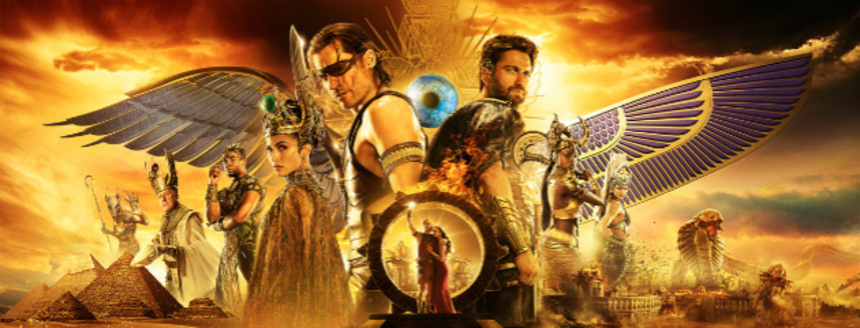Critical Distance: In Praise Of The Ridiculous

The Academy Awards do not have a category for ' best achievement in ridiculousness,' but if they did, Gods of Egypt would be a shoo-in next year.
I don't mean the description "ridiculous" like Adam Sandler probably intends it in The Ridiculous Six, or as a slap in the face that some critics may have meant in their reviews of Gods of Egypt, or in the manner that I meant it when I described a trailer for the film as looking pretty ridiculous. Yet even at that point, I had to acknowledge that I couldn't keep my eyes off it.
And that's how the movie played out for me. I was mindful of the reviews, including the one by our own Jim Tudor, in which his opening paragraph describes the film as an "overcooked onslaught of unreal bigness and loudness" and his concluding paragraph suggests that "for extremely forgiving fans of the old quest films, and also for 8-year-old boys, Gods of Egypt might approach good. Good graphics, anyway."
So, call me an extremely forgiving fan of the old quest films. Gods of Egypt hit my sweet spot, perhaps in part because my expectations had been lowered to zero by all the negative reviews. (My main motivation in attending the midday screening this past Friday was to get out of my apartment and have lunch at the local Alamo Drafthouse.)
Another reason, though, is the kinetic filmmaking by Alex Proyas. His films have been up and down experiences -- I loved Dark City, hated I, Robot, loved Knowing -- which reminds me that filmmakers who provoke a strong gut reaction are the ones I treasure the most, whether their films are considered "good" or "bad" by a critical or public consensus.
Proyas' best-known work, which includes The Crow, has been ridiculous in an absurd, 'I can't believe I'm seeing this on screen' and 'I'm so happy I'm seeing something so outlandish' over-the-top style. One reason that Proyas' films resonate so much for me is that so few movies nowadays are willing to reach for that level of absurdity.
Joel and Ethan Coen have done it on a regular basis -- Hail, Caesar! is sublime -- but inevitably their more cracked films fail to resonate with mainstream audiences. (The Big Lebowski placed #96 on the box office list for 1998, for example, even though it's established a reputation in the years since then as a beloved classic.)
 Recent years have not been kind to movies told in the style of "old fantasy yarns," unless they're dressed up in familiar clothing, as with Peter Jackson's The Hobbit tales, or blast off into outer space, as with J.J. Abrams' Star War: The Force Awakens. Both of those series are anchored by an essential seriousness of purpose, which keep them from flying too far off into the territory of the ridiculous, although I couldn't help but think of hobbits when human-sized mortals are pictured on screen with giant-sized gods in Gods of Egypt.
Recent years have not been kind to movies told in the style of "old fantasy yarns," unless they're dressed up in familiar clothing, as with Peter Jackson's The Hobbit tales, or blast off into outer space, as with J.J. Abrams' Star War: The Force Awakens. Both of those series are anchored by an essential seriousness of purpose, which keep them from flying too far off into the territory of the ridiculous, although I couldn't help but think of hobbits when human-sized mortals are pictured on screen with giant-sized gods in Gods of Egypt.
That early image, to be frank, made me laugh out loud, because it made me quickly realize that the people behind Gods of Egypt surely did not intend for it to be taken as a dead-serious treatise on mythology, or on the relationship between gods and men. It's a tale of giants who can transform into gold creatures! Who can fly! Who bleed gold, not blood! Who can bring dead mortals back to life (potentially, if they feel like it)!
Yes, it's a shame that no actors of Egyptian descent are included, but I'd like to think that's because any Egyptian actors who read the script rejected its silliness out of hand, even as other actors from around the world might have reacted and rejected the opportunity to make an appearance.
It takes a certain off-kilter mindset to embrace what's on display in Gods of Egypt and I can entirely understand why so many critics have ripped it to shreds. At the same time, I enjoyed myself thoroughly, and not in an ironic or 'so bad it's good' vein, but out of appreciation for the unbridled, ridiculous visions that collided in a wondrous explosion of sight and sound and color and gods and men and women.
More like it, please.
Critical Distance is a column by managing editor Peter Martin in which he displays his ample cultural ignorance and lack of common artistic taste.







